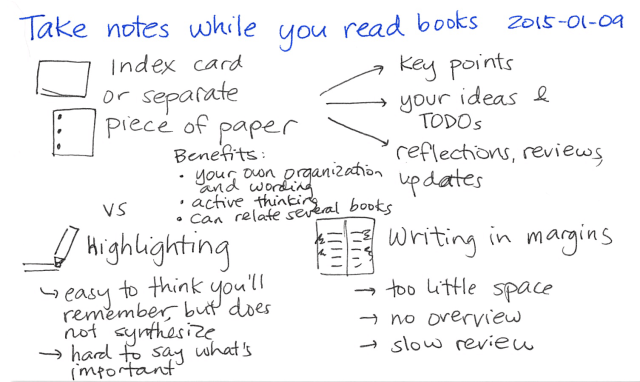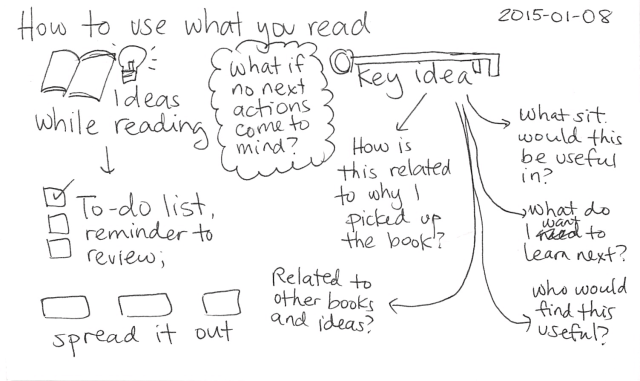Read business books more effectively through application, visualization, or reviews
Posted: - Modified: | learning, readingThis Quora question on "What is the most effective way to read a book and what can one do after reading?" got me thinking about how I read business books and what I do to make the most of them.
2015.01.08 How to use what you read – index card
Application: The best way to get value from a book is to apply it to your life. Reading The Lean Startup is one thing. Using its Build-Measure-Learn loop to run a business experiment is another. Reading Your Money or Your Life is one thing. Calculating your true hourly wage and using that to evaluate your expenses is another. Do the work.
As you apply an idea, you'll probably want to refer back to the details in the book, so it's good to keep the book itself handy. Write notes about your questions, ideas, TODOs, experiences, and follow-up questions.
Visualization: Not ready to do the work yet? Slow down and think about it. Imagine the specific situations where you would be able to apply the ideas from the book, and how you would do so. What do you need to learn or do in order to get there? See if you can get closer to being able to act on what you've learned.
Spend some time thinking about how the ideas in the book connect to other books you've read or ideas you've explored. What do they agree with or disagree with? Where do they go into more detail, and where do they summarize? What new areas do they open up?
Think about specific people who might be able to use the ideas in the book. Get in touch with them and recommend the book, explaining why they might find it useful. Imagine what kind of conversation the book might be relevant to so that you'll find it easier to recognize the situation when it arises. (This is a tip I picked up from Tim Sanders' Love is the Killer App, which I often recommend when people want to know more about how reading helps with networking.)
Review: Can't act on the book yet, and can't think of specific people or ideas to relate it to? Take notes so that you can review them later, and maybe you'll be able to think of connections then.
I don't like writing in books. Here's why:
- Most of my books come from the library, and I'd never write in those. This lets me get through lots of books without the friction of committing money and space to them.
- Highlighting is an easy way to make yourself think that you're going to remember something. Also, it's hard to decide what's important the first time through, so you might end up highlighting too much. When everything's important, nothing is.
- There's rarely enough room in the margins for notes, and you can't review those notes quickly.

2015.01.09 Take notes while you read books – index card
I prefer to write my notes on an index card or a piece of paper. If I'm near my computer, I might draw my notes on a tablet or type quotes into a text file. Keeping my notes separate from the book lets me review my notes quickly without thumbing through the book. I want to be able to refer to my notes while reading other books or while writing my reflections. Index cards, pages, and print-outs are easy to physically rearrange, and text files can be searched. Even if I read an e-book, I take my own notes and I copy highlights into my text files.
The best way to remember to review a book is to schedule an action to apply an idea from it. The second-best way is to connect it to other ideas or other people. If you don't have either of those hooks, you can review on a regular basis – say, after a month, six months, and a year, or by using a spaced repetition system. You might even pull a book out at random and review your notes for inspiration. When you do, see if you can think of new actions or connections, and you'll get even more out of it. Good luck, and happy reading!


4 comments
Karl Marty Balingit
2015-01-30T01:01:43ZInteresting points Sasha! Personally I'm a slow reader but am implementing tips from the likes of Tim Ferris, he has a lot of posts about speed reading (which I don't really like), I take my time and usually pause every now and then to note down key points. Thanks for your tips! :)
JoelMcCracken
2015-01-31T16:11:58ZSomething I really like to use is extra-wide postits. The ones I use are like this, but horizontal: http://www.amazon.com/Post-...
(incidentally, I think I'd rather use the ones at the above link)
You have to be careful sometimes because the glue may lift print off of what you're reading, but it does make the problem of taking notes a little easier. I had the note-taking-importance drilled into me from http://www.amazon.com/How-R..., which I'm pretty sure you've posted about in the past.
sachac
2015-02-01T16:06:30ZMmm... I've taken to using index cards for this because they're cheaper than Post-It notes, but I like using Post-Its for planning if I know I'm going to be plotting things on a wall. =)
Judy T.
2015-02-02T21:20:54ZOh wow. I thought I was the only one who wondered/worried about how much I read, and struggled with how/why to create value from it. I usually have at least 3 books I'm reading daily on my iPad, plus a physical book or two. I convince myself that "someday" I will go back and review the notes, link and share insights, etc. But I'm still not doing that and guilt creeps in every time I look at the "notes" list in finished ebooks, or the books I have piled for processing in some way.
Reading your thoughts on this *and* plenty of other "index card jottings" you've shared has really given me a sense of freedom actually. I get overwhelmed thinking about *all* the things I'd like to read/share/connect, that I don't do anything. Fear of the commitment or responsibility, maybe? Perfectionism also plays into it, as well.
Anyway....just felt like I had to say that these ideas you've shared about reading and notetaking and learning are valuable to me. Please keep it up.